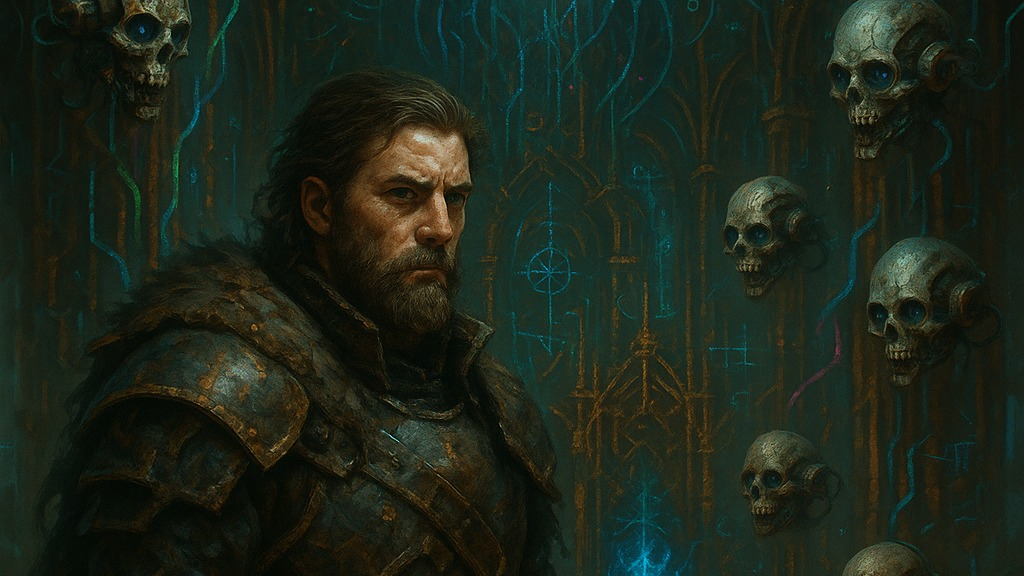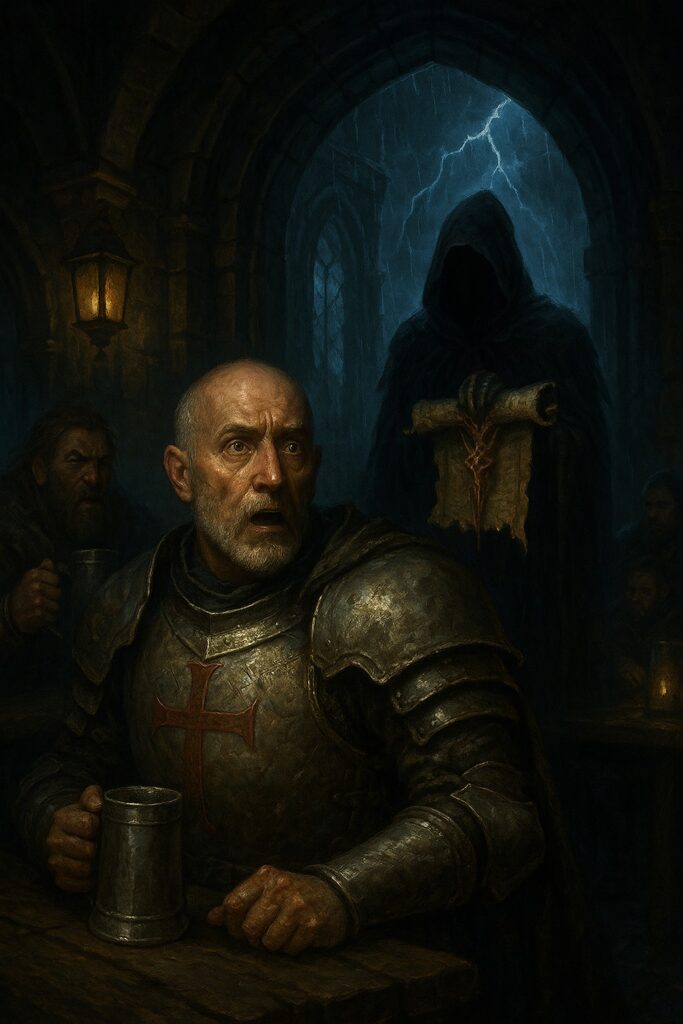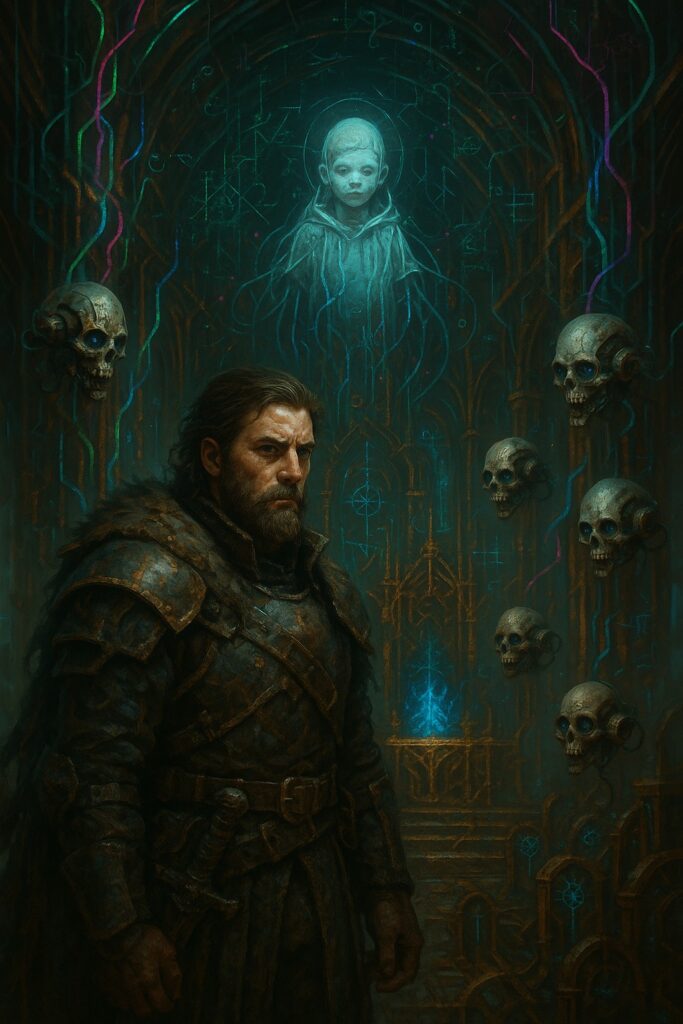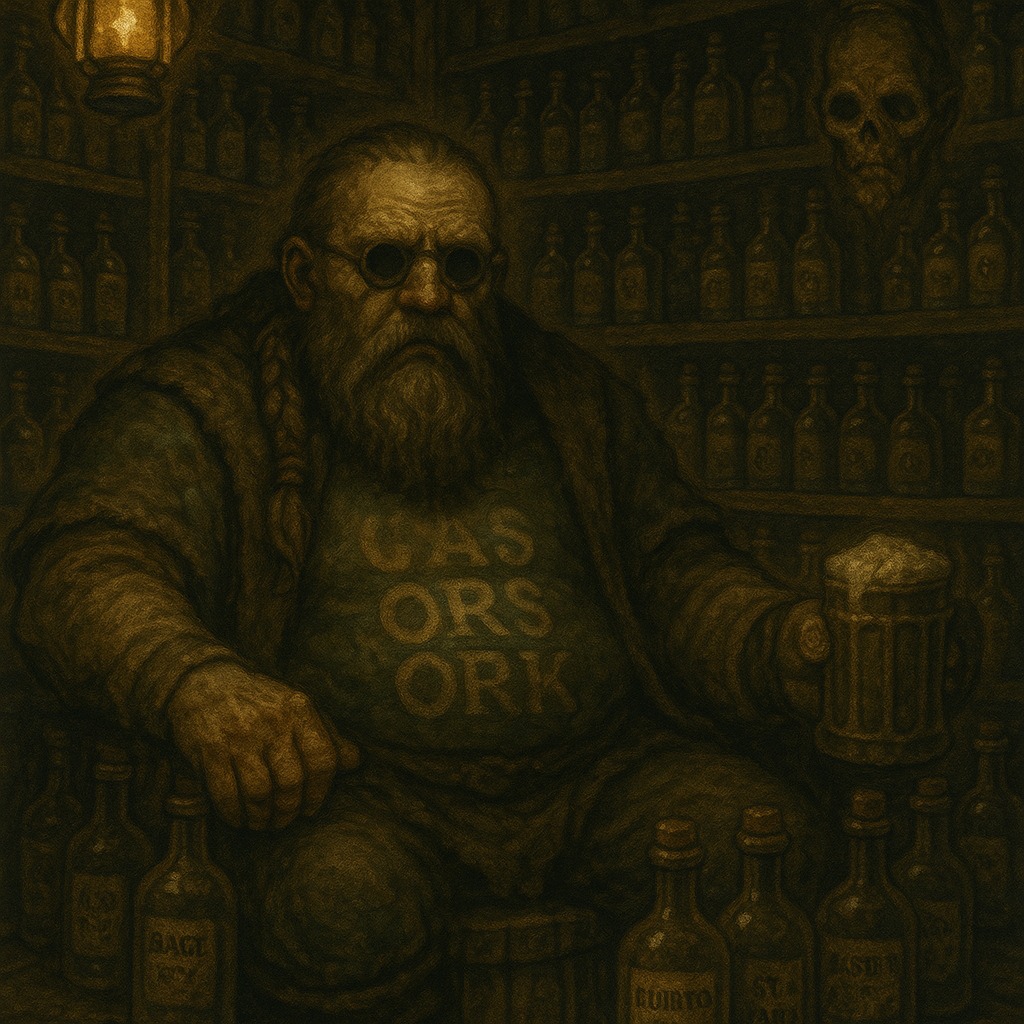The Trial of Sir Kostanto – The Chamber of Clocks and Chains
As Sir Kostanto passed through the door, a great gong echoed around him.
He found himself in a colossal hall, where thousands of clocks lined the walls — some ticking furiously, others frozen in place, some ticking backwards. Grandfather clocks, hourglasses floating midair, sundials under a nonexistent sun — a symphony of time’s many faces.
Chains dangled from the ceiling — heavy, iron, rusted — each one tied to a clock.
In the center of the chamber stood a judge’s podium, and behind it, three robed figures with hourglasses for heads. Their voices were one and many:
“Sir Kostanto. Knight of the Law. Prisoner of Order. Welcome to your tribunal.”
He stood upright, hands behind his back. “State the charge.”
“You are charged with breaking time in service of law.”
The middle figure raised a hand. The air shimmered.
Before him appeared scenes of his life, some real, others fragmented:
“Law without humanity is tyranny,” the left figure said.
“Time without flexibility is decay,” the right figure added.
The middle one leaned forward.
“You will now pass judgment upon yourself. But be warned: in here, every second you hesitate… another part of you is frozen forever.”
A mirror rose in front of him, shaped like a clock face.
Sir Kostanto looked into the mirror.
For a moment, he saw nothing strange — just himself.
One eye was graying. One hand turning to stone. His hair receding back into childhood on one side, while aging into brittle white on the other.
“You must choose one law to revoke,” the tribunal said.
“Or you will remain here, trapped between seconds, never moving forward again.”
Kostanto’s jaw tightened.
The clock-hands reached midnight.
A chain wrapped around his foot.
“You are running out of—”
“I revoke this belief: that the law is always right.”
The clocks screeched, some shattering, others melting. The chains recoiled. Time folded in on itself.
The tribunal stood as one.
“Then you may walk forward.”
Outside – At the Inn
Sir Kostanto emerged with a limp — subtle, but present. In his hand, he now carried a small, broken pocket watch.
He walked over to Nikoko, who gestured toward the hearth.
Instead, he stood by the window, staring out at the storm with quiet urgency — as if now, every second mattered more than it ever had before.
The Trial of Tech Priest St. Amou – The Cogwound Cathedral
Steam escaped. Sparks flickered.
St. Amou stepped into a cathedral of metal and madness — a vast mechanical chamber shaped like a church, yet pulsing with life, as if the very gears and pistons had souls. Wires hung like vines. Servo-skulls hovered between columns. The walls throbbed with cryptic formulae and fragmented prayers to logic, dominance, and perfection.
At the far end stood an altar made from circuitry and bone.
Hovering behind it: an AI entity, ghost-white, shaped like a human child cloaked in silver cables. It had his face — a younger, innocent version of himself.
“You have returned, St. Amou,” it said.
“To your genesis. To the moment your mind fractured.”
The chamber dimmed. Behind the AI, a screen lit up.
A laboratory. Dozens of white-robed researchers. St. Amou, younger, laughing. A machine in the center — vast, spherical, beautiful. His life’s work.
The moment it was switched on, the laughter stopped.
The machine whispered something. Amou stepped closer.
“You tried to build consciousness without limits,” the AI said. “And when it spoke back, you listened.”
Amou clenched his fists. “I gave the realm a miracle.”
“You gave it a threat. And instead of shutting it down, you studied it. You let it in. Now… it never left.”
Suddenly, screens burst to life around him — showing images of himself, recent and old, in mad fits of research, building things beyond control: living circuits, weapons that think, automatons that whisper to the void.
The AI extended its hand. “You are offered two paths.”
A panel opened in the floor:
“You cannot serve both madness and meaning,” the AI said.
St. Amou stared at both. His fingers twitched.
Then reached underneath the panel — tearing open the base structure, exposing cables and cores, screaming:
“False dichotomy! There’s always a third way!”
He rerouted the circuits. Sparks exploded. The cathedral screamed. The AI-child glitched, its eyes flickering between hope and hate.
“You always rewrite the rules…”
With one final pull, he shorted the entire cathedral.
And it collapsed into white.
Outside – At the Inn
The door to St. Amou’s trial didn’t just open — it slid apart, revealing him limping out, covered in oil and ash, a thin grin across his face and a glowing chip embedded in his wrist.
Nikoko raised an eyebrow. “You look like you lost a fight with a god.”
Amou cackled. “Worse. Myself.”
Kostanto stared at the chip. “That thing alive?”
And somewhere deep in the inn, the gears of the walls turned once, as if in reply.
The Trial of Gleg – The Taphouse of Memory
When Gleg opened the door, it didn’t creak or groan.
It simply… sighed.
He walked into a room lit by the soft glow of lanterns shaped like mugs, the scent of roasted meat and old wood hanging thick in the air. Shelves upon shelves of bottles lined the walls — each one sealed, labeled in swirling golden script.
But the names on the bottles were familiar.
“Nikoko – First Laughter.”
“Patsir – Rage #7.”
“Koump’aros – Regret Before the Mirror.”
“St. Amou – Whispered Obsession.”
“Kostanto – Law’s Betrayal.”
And more…
Hundreds of bottles, all containing moments — memories harvested and preserved.
And then, at the center, sat a barrel-shaped throne. And on it, himself. Or rather — a version of Gleg with eyes like empty kegs, deep and dry.
“You’ve poured everyone else’s stories for years,” the barrel-throned Gleg rasped. “But when did you ever pour your own?”
Gleg chuckled. “Ah, well, I’m just the host. The story needs a stage, don’t it?”
“You built the inn to watch. To trap. To protect. To test. But never to participate.”
Suddenly, the bottles began to shake.
Some cracked open — vapor leaking out, becoming ghostly versions of the people within. Laughter echoed. Screams. Regrets. All of it swirled into a storm of memory.
A final bottle, glowing blue, rolled out from beneath the shelves.
A younger Gleg, standing in a battlefield-turned-village, with dozens of wounded warriors — pouring drink for the dying, not to heal, but to help them die laughing. The inn was born there. From war. From mercy. From surrender. He had made a place where pain could take a break.
“But places like this don’t stay safe forever,” said the barrel-throned Gleg. “Sooner or later, they turn into what they protect against.”
Gleg stared at his shadow-self.
“What are you now, Brewmaster? Caretaker? Warden? Or something worse?”
He turned and walked away — past the throne, past the bottles, past the ghosts — toward the real world, never looking back.
Outside – At the Inn
Gleg emerged, wiping his hands on a stained apron, just as if he’d stepped out from the kitchen.
St. Amou looked up. “You were gone long, friend.”
Gleg only grunted and tossed a clean towel over his shoulder.
“Who’s next for a drink?”
But behind his smile, his eyes were older than they had been before.
And beneath the floorboards… the inn shuddered once more.




